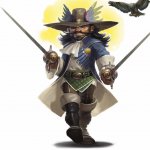Role play, it makes since that if a Role is missing from the Party that is what they would most willingly recruit into their number. I have not problem with that and it causes less problems. For example, healer dies, player comes back as a scout... party has a scout already now they fight over who does what and when, possibly one of them ends up changing characters through role play for meta reasoning. If the original scout didn't want to change and the original cleric was happy being a healer but only changed because the GM didn't like them coming back as the same role, then 2 players are now unhappy and one left a character which the player an party was invested in for a meta game reason that only hurts the game in my opinion.
As far as the race, class, and subclass... I feel like they need to change something to distinguish the character or players might just merge them mentally and death loses value of investment. I would prefer if the human cleric PC dies and the Player wants to be a healer, he next character be an elf druid healer (for example) over a anther human cleric so that the feel is different. However, if a player can create a sufficient backstory that explains it... like twin honoring his brother, the clerical order sending a replacement "understudy" to fill the void for this highly important mission of which they were informed. But that needs to happened within reason in the story with the order, brother, etc being informed. If they are in the middle of a dungeon when a player dies that player will need to justify how this person managed to be there to be found which makes a random … "we found a druid in a cell, WHAT LUCK we really need a replacement for our healer!!" a lot easier to work in despite being super convenient. If after the dungeon the order, brother, etc is notified and the player wants the now free druid to "move on" and return to their family.... I am okay with that. Their is perhaps a chance that they discover they like their temporary character and it becomes permanent. I leave that up to the player. What I don't do is have the player wait until they finish 3 sessions in the dungeon to bring in a new character. I will always find a way to give them chance to play a temporary character until they can add the one they want, even if I just end up giving them an NPC that was traveling with the group. I see no reason to ever have a player who took the effort to show up "sit this one out" for "the sake of story" … In my opinion, Fun trumps story.



